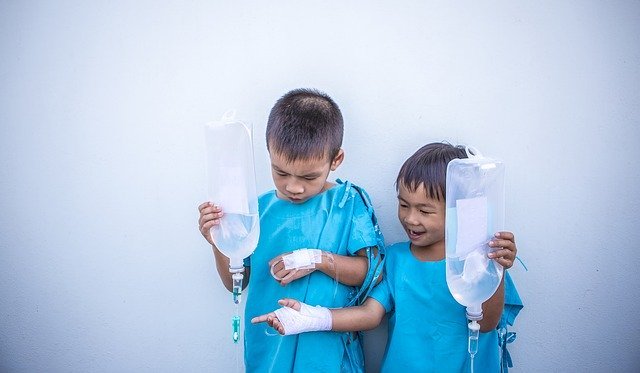
By now, we know Coronavirus disease 2019 (COVID-19) is a respiratory illness that can spread from person to person.
While the situation is swiftly evolving, and experts are learning more daily, concerns about the younger population may be weighing on parents’ minds.
We do know there is no evidence that suggests children are more susceptible to the virus, and there are a few possibilities as to why.
“The first, and most likely scenario, is that children are contracting COVID-19 but are getting a milder version of the disease,” says Thomas Murray, MD, Ph.D., a Yale Medicine pediatric infectious disease specialist and associate medical director for infection prevention at Yale New Haven Children’s Hospital.
Other possibilities: they’re not being exposed, or they’re exposed and don’t contract infection.
“Given how quickly it circulates and what we know about other respiratory viruses in children, this is unlikely,” says Dr. Murray. Based on what’s known, it appears children contract COVID-19—but present a milder disease.
As of today, there have been no known deaths reported in the 0-9-year-old age group and there have been few hospitalizations. The disease seems to primarily impact older adults and those with underlying health problems.
Still, parents want to be informed and take precautions where possible. Below are answers to questions parents might have about COVID-19 and how it affects children.
What preventative measures should parents practice with their kids?
“Wash your hands, wash your hands, and then wash your hands,” says Dr. Murray. “Kids like to touch their face. Your nose, mouth, and eyes are all portals of entry for viruses into your body.”
Frequent hand washing, especially with toddlers and kids who are in daycare, is important.
Keep kids away from people who are sick, especially if they have respiratory symptoms. And if your kids are sick, keep them home.
For COVID-19, one of the most important things for containment is to isolate people who have the virus.
While it’s not clear yet how much COVID-19 is transmitted from surfaces, we know other respiratory viruses can be.
“We recommend cleaning surface areas with products that are documented disinfectants, like Lysol, or bleach-based products for surfaces that can handle bleach,” says Dr. Murray.
When should parents keep their children home from school?
The short answer: it’s not much different today than any other time. “Any fever, cough, respiratory symptoms—these are all reasons to stay home,” says Dr. Murray.
And, if you have a child with a respiratory illness who has frequent contact with elderly grandparents or caregivers, try to separate them until the child is feeling better—kids can be reservoirs for respiratory illness.
When should a parent call the doctor?
Call your provider if you know you have been exposed to someone who is a positive COVID-19 case, or if you have a high fever, severe cough—just like you would otherwise.
“You don’t have to call your pediatrician for mild illness because it could be any number of viruses,” says Dr. Murray.
“Again, the virus appears to be mild in children, and there are no available therapies today. Care for the infection is directed toward the symptoms: Tylenol, ibuprofen, and hydration with fluids, like chicken soup.”
Providers urge families to avoid the emergency room unless their child genuinely requires emergency care.
Today, YNHH does not offer a test for COVID-19; coming to the hospital to get tested would not be successful.
This will also help keep emergency services available for the children who really need them and protect children who are most at-risk.
Start with your regular pediatrician or PCP and only bring your child to the emergency room if they require emergency care.
Do COVID-19 symptoms differ from flu symptoms?
COVID-19 presents respiratory illness with symptoms including fever, cough and shortness of breath. Flu symptoms are similar, and usually come on suddenly.
Symptoms include fever higher than 100.5 degrees, extreme exhaustion, muscle or body aches, and chills.
The flu, particularly influenza B, has hit children across the country hard this year.
“We’re not out of the woods with flu season yet,” says Dr. Murray. If influenza is diagnosed early, within the first 48 hours, then there are medicines that may help your child get better faster.
“It doesn’t get rid of the flu all together, but it can make your child feel better a little faster.”
Are there additional protective measures for children with chronic pulmonary or respiratory illness, like cystic fibrosis?
“For those families, don’t treat this any differently than flu or other highly contagious respiratory illnesses,” says Dr. Murray. “Wash your hands and avoid sick contacts.”
What should we logically prepare for?
“It’s a moving target,” says Dr. Murray. If you do contract COVID-19 or are exposed to a diagnosed patient, be prepared to be quarantined for 14 days—so have enough household supplies to keep you stocked for two weeks.
“Here [at YNHH], we have been preparing for this for more than a month.
We’re hopeful that our preparation can help contain the illness and provide outstanding care for any affected children that require hospitalization,” says Dr. Murray.
In closing…
Prepare, don’t panic. There is potential for widespread disease, and it may not even be as severe as the flu if your child contracts it.
“Just be vigilant. Wash your hands. It’s about containment, not seriousness of disease, because it’s new. In five years, this may be just like flu or RSV,” says Dr. Murray.
Information is rapidly changing. Please check back to the resources below frequently for up to date information about COVID-19.
Written by Lauren Perry.



